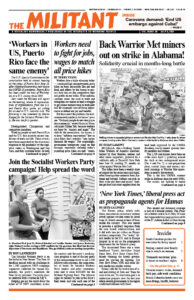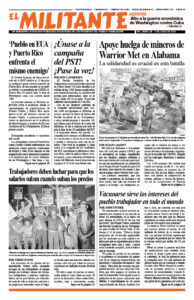July 1, 1996
The following statement was released June 19 by James Harris and Laura Garza, Socialist Workers candidates for president and vice president of the United States.
Responsibility for the escalating racist burnings of Black churches throughout the South weighs squarely on the shoulders of the federal government. Two more Black churches were torched in Mississippi June 17, bringing the total number of churches burned to 37 — at least four in the last week.
Our campaign is calling on defenders of democratic rights, Black rights activists, and the labor movement to demand the Clinton administration send federal troops to defend Black churches throughout the South. At the same time speak-outs, picket lines, and other protests are needed to condemn these racist assaults and press the government to apprehend and jail those responsible.
July 9, 1971
FORT GREELY, Alaska — The GI antiwar movement here is deepening and shaking up the brass. A second issue of the Arctic Arsenal has been distributed on post and greeted with an even more favorable reaction than the first issue.
The June edition focuses on the defense of GIs’ rights and an explanation of why the brass has become so persistent in attempting to deny them. In addition to the distribution of the Arsenal, meetings have taken place on post to formally establish a staff to ensure the paper’s continued existence.
The real culprits are not GIs standing up for their rights, but the brass and lifers who try to deny those rights. The Arsenal has received dozens of letters of support from individual citizens, congresspeople and antiwar organizations. GIs at Ft. Greely intend to wage a public, political and legal defense.
July 6, 1946
The sinister news that has periodically shocked the world working class once again comes from Moscow: Another purge is on. Like its predecessors, the new purge strikes at every sphere of Soviet life. The first Moscow report discloses that involved are branches of industry from the still-devastated areas in the Ukraine, through Leningrad to the distant Urals and beyond.
The “peacetime” purge comes on the heels of new military regulations which surpass in harshness the wartime code.
These developments prove how hollow were the boasts that the Kremlin regime had been greatly strengthened by the victorious end of the war. Stalin’s rule remains the regime of crisis it has been from its inception. To survive Stalin is compelled to resort to the same methods of rule — terror and repression — by which he has maintained himself up to now.

